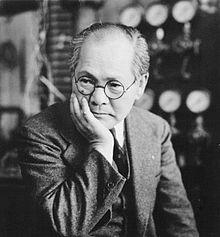Yoshio Nishina
| Yoshio Nishina | |
|---|---|
 |
|
| Native name | 仁科 芳雄 |
| Born |
December 6, 1890 Satoshō, Okayama |
| Died | January 10, 1951 (aged 60) |
| Nationality | Japanese |
| Fields | Physics |
| Institutions | RIKEN |
| Notable students |
Hideki Yukawa Sin-Itiro Tomonaga Shoichi Sakata |
| Known for | Klein–Nishina formula |
| Notable awards |
Asahi Prize(1944) Order of Culture(1946) |
Yoshio Nishina (仁科 芳雄 Nishina Yoshio?, December 6, 1890 – January 10, 1951) was a Japanese physicist. He was called "the founding father of modern physics research in Japan".
Nishina was born in Satoshō, Okayama, and graduated from Tokyo Imperial University as an electrical engineer in 1918. After graduation, he became a staff member at the Institute of Physical and Chemical Research (now RIKEN).
In 1921, he was sent to Europe for research. He visited some European universities and institutions, including Cavendish Laboratory, Georg August University of Göttingen, and University of Copenhagen. In Copenhagen, he did research with Niels Bohr and they became good friends. In 1928, he wrote a paper on incoherent or Compton scattering with Oskar Klein in Copenhagen, from which the Klein–Nishina formula derives.
In 1929, he returned to Japan, where he endeavored to foster an environment for the study of quantum mechanics. He established Nishina Laboratory at RIKEN in 1931, and invited some Western scholars to Japan including Heisenberg, Dirac and Bohr to stimulate Japanese physicists. His laboratory was severely damaged during World War II and most equipment had to be discarded and rebuilt after the war.
He died from liver cancer in 1951.
...
Wikipedia
